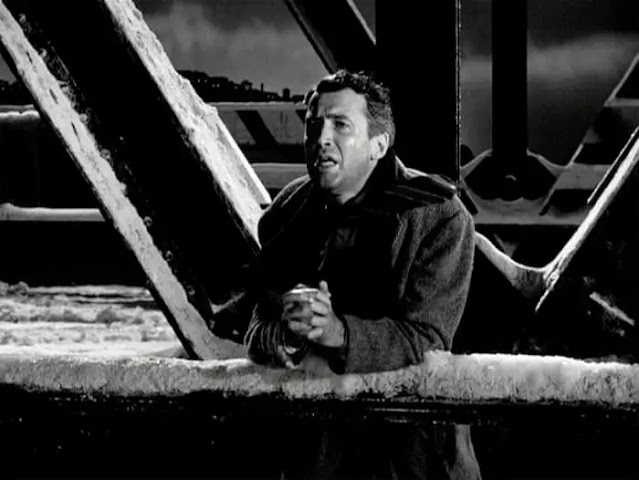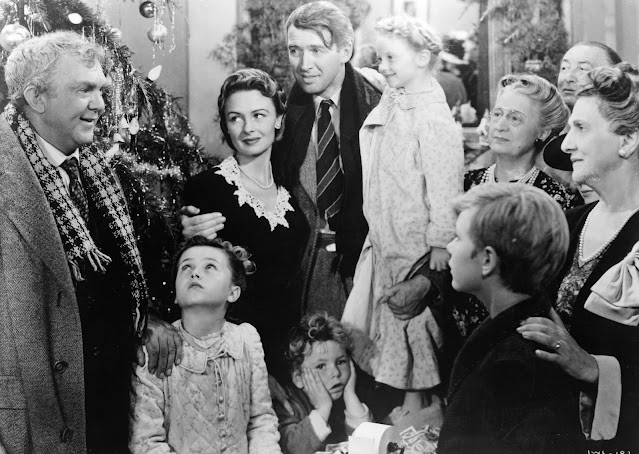Every Christmas season there are certain films that have become traditional for the family to get together and watch. These feel-good holiday classics usually have an uplifting message and a degree of sentimental nostalgia to them that make them the go-to holiday films. Hollywood tries to add new films to that list every season but, with few exceptions (Elf), these cookie cutter holiday films fail to have any real staying power. I’m sure someone out there rewatches Four Christmases or Deck the Halls annually but they would be in the minority. A Christmas Carol, any version, generally has its fans and gets a rewatch regularly as does the odious Dr. Seuss’s How The Grinch Stole Christmas with Jim Carrey. Frank Capra’s It’s a Wonderful Life also tops the list of holiday classics that oddly only features the holidays in the final quarter. The message is a good one for the holidays and everyone remembers Jimmy Stewart holding his family close to him underneath the Christmas tree but three quarters of that movie doesn’t even take place in winter let alone Christmas. Most people only remember the stuff at the end of the film; perhaps that’s why it is remembered so fondly as a Christmas movie.
The movie is about a promising young man, George Bailey (James “Jimmy” Stewart), who is preparing to leave for an extensive trip to Europe. As a young boy he saved his brother’s life from drowning, losing the hearing in one ear in the process. Their father runs a Building and Loan that helps the needy afford and keep homes that the bank would have otherwise foreclosed on. This business is a thorn in the side of greedy investor Mr. Potter (Lionel Barrymore) who sees this as bad business and wants to absorb the company and close it down. The stress of the business drives Mr. Bailey into an early grave and George gives up his trip to Europe to stay behind and help keep the place afloat for a few months until George can leave it to his father’s partner and go off to college. But the board of directors at the bank will only agree to keep the Building and Loan open if George runs it in his father’s place. Rather than see the good people of Bedford Falls lose their homes when Potter takes their loans over, George abandons his plans for college and takes over the loan office.
George gets reacquainted with Mary (Donna Reed), a young girl who had a crush on him throughout their childhood. They marry and have several children. George’s brother, Harry (Todd Karns) uses George’s tuition money to go to college, himself, with the understanding that upon graduation he will take over the Building and Loan allowing George to pursue other interests. But when he returns, married, he has a job offer to work for his father-in-law and George is resigned to being forever tied to the business. He and his wife move into a real fixer-upper and settle down repairing the place a little at a time. George runs the Building and Loan just like his father, assisting people when they cannot afford their payments rather than foreclosing on them the way Potter would. This ingratiates him to the community and allows it to flourish and grow. One day, around Christmas time, Billy (Thomas Mitchell), George’s partner, loses the Building and Loan deposit of $8,000. The money ends up in the hands of Potter who, knowing what it is, conceals it believing it will cause George to be arrested for fraud and the business will fall into his hands finally. Distraught and with nowhere to turn, George contemplates suicide, wishing he were never born.
It’s a Wonderful Life is saccharin, it really is. George Bailey is portrayed as almost saintly the way he always puts off his own wants and desires. In some ways this is reminiscent of Frank Capra’s earlier film You Can’t Take It With You, a movie with similar themes of friendship being the ultimate wealth. Unlike that film, however, there is no change of heart for Mr. Potter who remains a cold hearted curmudgeon right until the end. He doesn’t even get his comeuppance for stealing the $8,000 and letting George take the fall for it. Instead, the whole town rallies around George and raises the cash to cover the deficit, similar to the people raising money to bail out and pay the fines for Mr. Vanderhof in You Can’t Take It With You.
This is the movie where we get the famous quote: “Every time a bell rings an angel gets his wings.” This comes from the fantastical element of the film represented by some flashing galaxies in space observing George Bailey as he prepares to throw himself off a bridge. They call in an angel, Clarence (Henry Travers), to travel to earth and save George from himself and show him all the good he has done with his life over the years. Clarence magically transfers George to an alternate reality in which he had never been born, giving him a first-hand view of just how much of a difference he really has made. It’s a riff on A Christmas Carol only George isn’t seeing the past, present and future; he’s seeing the present had he not existed. Potter has taken over the whole town renaming it to Pottersville, his brother died in the frozen lake, Billy was committed to an asylum, and Mary is a spinster, never having married. Lots of people lost their houses or never managed to get one on the first place. It shows just how much good one person can do in this world.
Frank Capra’s film may be unsubtle in its messaging but it is done this way on purpose. The film would lose its charm without all that sugar. It takes building George up so high to hammer home just how dire the situation is later when the money goes missing. George isn’t perfect. He is tempted to take a high paying position with Potter, but his caring nature steps in and shows him how much would be lost if he did. After the money goes missing he goes home, loses his temper with his kids and his wife, having the only disagreement between the two of them we ever see. His daughter’s teary cry out, “Oh, Daddy,” is heart breaking and says more than any action could.
It’s a Wonderful Life is listed as one of the greatest Christmas movies of all time. I can’t argue with that. It truly is a great film and one everyone should watch annually with family gathered around the television to share in the story and the spirit. It’s one of Jimmy Stewart’s defining roles although it is far from his first film. He navigates the pitfalls of over-sentimentality and grounds this film with his charm and good will. Lionel Barrymore is spot-on, too, as the despicable Mr. Potter. For years this was the only movie I knew him from and when I saw him in other stuff later I was floored that he could be equally effective in honorable roles, he is that good here. He doesn’t get punished for his dishonesty in this movie but that is the right call; this film is not about getting justice. His reward will come eventually, even if not in this life. There will be no Clarence sent down to save his sorry soul. George, however, has something ever better than Clarence. He has friends, people he has deeply affected over the years that will rally to his defense when he is at his lowest proving that no man is truly poor who has friends.
Academy Award Nominations:
Best Picture: Liberty Films
Best Director: Frank Capra
Best Actor: James Stewart
Best Film Editing: Williams Hornbeck
Best Sound Recording: John Aalberg
Technical Achievement Award: Russell Shearman and RKO Radio Studio Special Effects Dept. (won)
____________________________________________________
Release Date: December 20, 1946
Running Time: 131 Minutes
Not Rated
Starring: James Stewart, Donna Reed, Lionel Barrymore, Thomas Mitchell, Henry Travers, Beulah Bondi, Ward Bond, Frank Faylen, and Gloria Grahame
Directed By: Frank Capra









Comments
Post a Comment